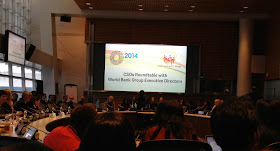 |
| Citizens of countries gathered to offer polite yet pointed criticisms to World Bank Executive Directors. |
Yesterday, I stated here that I wanted to find out what is happening with World Bank reform to make it work better for people in poverty and what civil society groups currently think about it. Well, after a full day of civil society meetings, I certainly got a lot of information as NGO groups and affected citizens converged en mass to the World Bank (the world's largest provider of loans, grants, and financial services to governments with the objective to end poverty) to each give their own answer to those questions. I can conclusively say...it depends on who you ask.
Before we go any further, let's address the question, "What is civil society?" Not governments. Not corporations. The rest of us. Just regular folk. Sometimes it can mean a lot of people formally banded together in large groups called non-government organizations (NGO's) like CARE or Save the Children. It can refer to a community of local people with an interest in protecting their environment. It also includes a couple of socially-minded bloggers like me and my World Moms Blog buddy at the meetings, Jennifer Burden. Civil society groups play many roles such as service providers, experts, advocates, and even "watchdog groups" that report to the public when something goes amiss. Generally, these groups closely represent the people in poverty who the World Bank seeks to help.
I have met civil society members from many different countries who offer damning critique of the World Bank. I've also talked to some who feel the World Bank is generally moving in the right direction...although slowly than they'd like.
My observation is that the World Bank is indeed setting a new course with a good captain at the helm. However, it's a really, really big ship to turn and it has to take time.In recent years, we've seen new structures put in place under the leadership of Dr. Jim Kim. In between Dr. Kim and people struggling in poverty are layers of bureaucracy and history to overcome. Dr. Kim has taken on quite an aggressive agenda which isn't very popular for some staff members. Even as we sat in the meetings yesterday, Dr. Kim faced criticisms from his own staff - furious about cost-cutting reforms - reported by the Financial Times. At this point, he's 2 years into a five-year term. Can he make enough progress in his reform agenda to create a World Bank with the best interest of poor people at heart AND be renewed for another term? Can he do it even with all the internal opposition from those who prefer to keep things status quo? Well, we did ask a similar question about U.S. President Obama and he was elected for four more years!
 |
| Sharmila Karki from NGO Federation of Nepal asks a question of World Bank staff |
Change is not going to be quick for the World Bank and the countries it serves. Eliminating corruption, engaging civil society in 100% of new projects, protecting the environment, and cutting costs are all going to take time. The best thing we - members of civil society - can find it is to keep the pressure on them and help them do it no matter how long it takes!
No comments:
Post a Comment